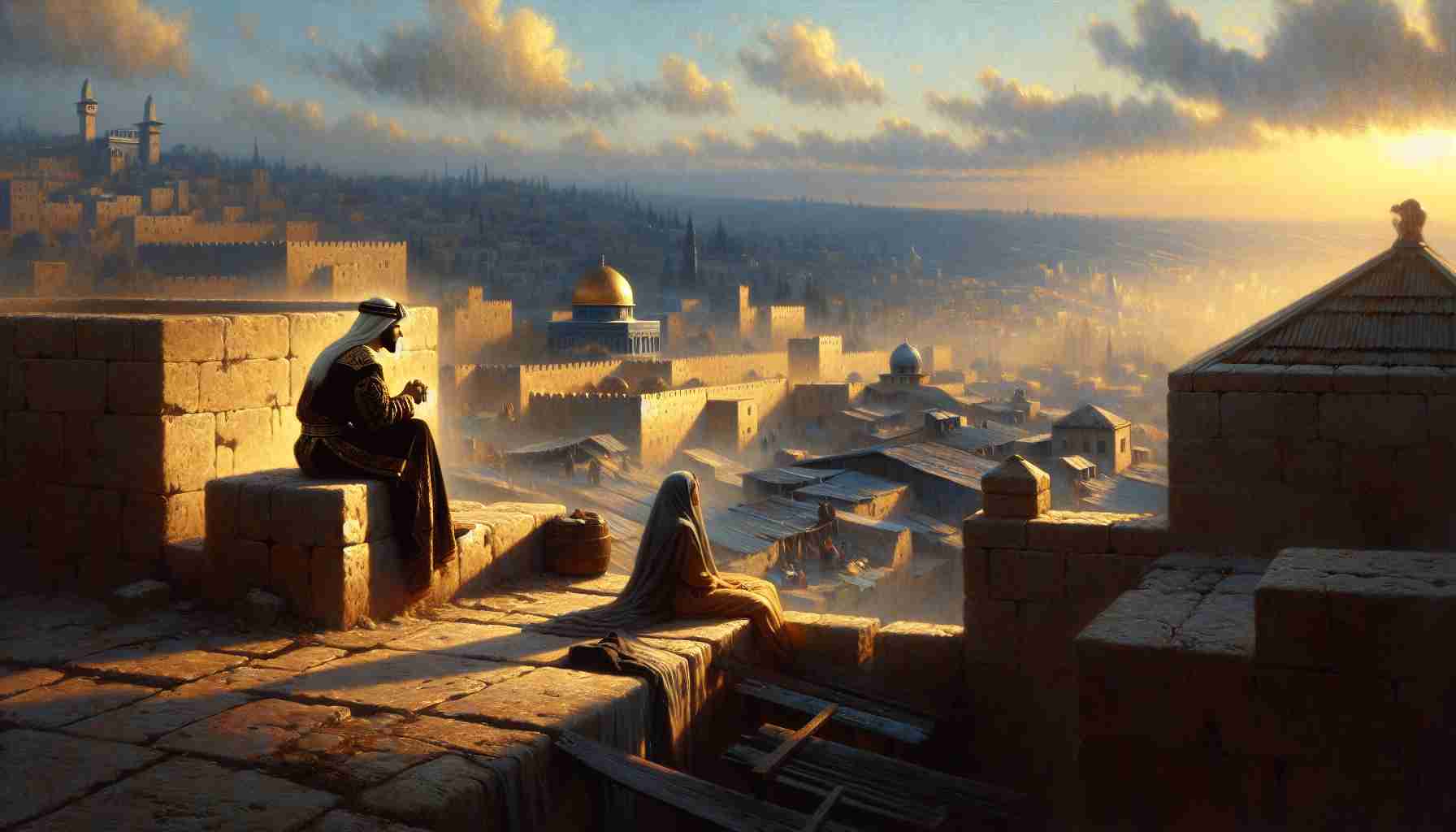

I was a young guard at the gates of Yerushalayim during the final years of King David’s reign. Barely old enough to hold a spear steady. Still afraid to speak too loud in the presence of a commander.
But I listened. And I saw more than I was supposed to.
One afternoon, when the army was off at war, I spotted the king alone on the palace rooftop. No generals. No advisors. Just David, pacing above the city like a man carrying something heavy.
I didn’t know what he was looking at.
Later, I heard the name: Bat-Sheva. Bathsheba. She had been bathing on a rooftop below. The king had seen her. She was the wife of Uriah—a loyal soldier fighting in Ammon, still risking his life for the king who now summoned his wife in secret.
At first, I tried to believe it was official business. A matter of state. But servants talk. And the truth caught up fast.
Bat-Sheva became pregnant. Uriah hadn’t even returned from the battlefield.
Then came a message I’ll never forget: the king had ordered Uriah placed on the front lines… and left there.
He died in the next battle.
I couldn’t stay quiet. I went to a priest in the city—voice shaking, heart pounding. “Can a king do this?” I asked. “Can Hashem still bless hands that take what isn’t theirs?”
He didn’t answer right away. Just sighed. “Even a king must return to God.”
Days later, the prophet Natan came to the palace. He told a story about a rich man stealing a poor man’s only lamb. David was furious. “That man deserves to die,” he shouted.
And Natan said, “You are that man.”
I wasn’t there for what followed. But word spread quickly. The king tore his robe. He stopped eating. He lay in the dust for days. He didn’t try to hide it. Didn’t make excuses.
He just wept.
He wrote songs after that. Songs we still sing. One of them begins, Create in me a pure heart, O God.
I had always believed strength was about crowns and swords. But that day, I learned something else.
Even the greatest can fall.
And even the fallen can return—if they’re willing to be broken first.
I was a young guard at the gates of Yerushalayim during the final years of King David’s reign. Barely old enough to hold a spear steady. Still afraid to speak too loud in the presence of a commander.
But I listened. And I saw more than I was supposed to.
One afternoon, when the army was off at war, I spotted the king alone on the palace rooftop. No generals. No advisors. Just David, pacing above the city like a man carrying something heavy.
I didn’t know what he was looking at.
Later, I heard the name: Bat-Sheva. Bathsheba. She had been bathing on a rooftop below. The king had seen her. She was the wife of Uriah—a loyal soldier fighting in Ammon, still risking his life for the king who now summoned his wife in secret.
At first, I tried to believe it was official business. A matter of state. But servants talk. And the truth caught up fast.
Bat-Sheva became pregnant. Uriah hadn’t even returned from the battlefield.
Then came a message I’ll never forget: the king had ordered Uriah placed on the front lines… and left there.
He died in the next battle.
I couldn’t stay quiet. I went to a priest in the city—voice shaking, heart pounding. “Can a king do this?” I asked. “Can Hashem still bless hands that take what isn’t theirs?”
He didn’t answer right away. Just sighed. “Even a king must return to God.”
Days later, the prophet Natan came to the palace. He told a story about a rich man stealing a poor man’s only lamb. David was furious. “That man deserves to die,” he shouted.
And Natan said, “You are that man.”
I wasn’t there for what followed. But word spread quickly. The king tore his robe. He stopped eating. He lay in the dust for days. He didn’t try to hide it. Didn’t make excuses.
He just wept.
He wrote songs after that. Songs we still sing. One of them begins, Create in me a pure heart, O God.
I had always believed strength was about crowns and swords. But that day, I learned something else.
Even the greatest can fall.
And even the fallen can return—if they’re willing to be broken first.